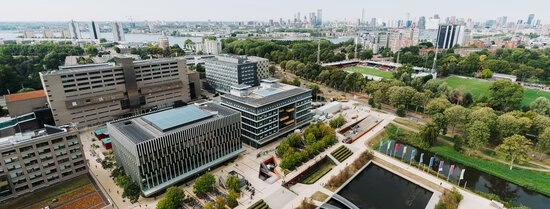From 1 March, Ronald van Raak is Professor of Philosophy in the Netherlands at Erasmus School of Philosophy. In doing so, the former professor of Erasmian values broadens and deepens his teaching and continues a fine research tradition in Rotterdam.
A thousand years of thinking in these regions is well worth studying, believes Ronald van Raak, the new Professor of Philosophy in the Netherlands. We interviewed Van Raak about his new appointment: "Our country is a crossroads of philosophy in Europe."
Why philosophy in the Netherlands?
“When I started at ESPhil in April 2021, this was the only place at Erasmus University Rotterdam where the life and work of Erasmus was studied. It is also one of the few places in our country where research on philosophy in the Netherlands is conducted. It is strange that in this country so little attention is paid to its own philosophical tradition. This research is interesting and provides insights that are still relevant today.”
Why the Netherlands? Isn't that nationalistic?
"If the study of philosophy in the Netherlands teaches anything, it is how internationally intertwined it has always been. Think of Erasmus, who traveled all over Europe, or Spinoza, who was the son of migrants. In our region, Descartes was able to develop his philosophy and a philosophy emerged based on Newton's teachings. Someone like Jacob Moleschott was known throughout Europe in the nineteenth century, but almost forgotten in our country. Or the movement of significa, a century back, a philosophy of language that achieved international fame."
So why was so little attention paid to this?
“In Rotterdam, research in philosophy in the Netherlands is in a tradition going back to the time I studied here, which was in the 1990s. We want to continue and strengthen this tradition. We quickly got used to looking across borders and that is good, but philosophers and philosophies from other areas also came to these parts. Our country is a crossroads of philosophy in Europe and that is well worth studying. The practice of philosophy in our country was also always wonderfully multidisciplinary, with close ties to theology, natural sciences and psychology, for example. Philosophers helped shape public debate and got involved in politics, encountering the limits of tolerance in this country. This is also instructive for philosophers who now want to get involved in public debate.”
In this role, what will you do first?
"The attention for philosophy in the Netherlands is great, all over the country I get to give lectures on the subject. A thousand years of thinking in these regions has produced a wealth of insights that are historically interesting, but can also be relevant to discussions now. For instance, Erasmus and Spinoza helped me to think better about shared values in our society. A movement like the Modern Devotion is an example of women in the Middle Ages thinking about issues like God and meaning, but outside the framework of the church. Now I am working on an overview of thinking in our regions, from the year one thousand to the present. That is providing all kinds of new insights for me and showing how much we do not yet know.’
- More information
Van Raak has written several books on philosophy in the Netherlands in recent years. In 2024 he published Spelen met waarden, betalen met gedachten. Erasmus, Spinoza en dat wat ons binds. Recently it appeared Het begon in Deventer. De waarden van de Moderne Devotie (2025), about the influence of this spiritual movement from the late Middle Ages on Erasmus, among others.
- Related content

